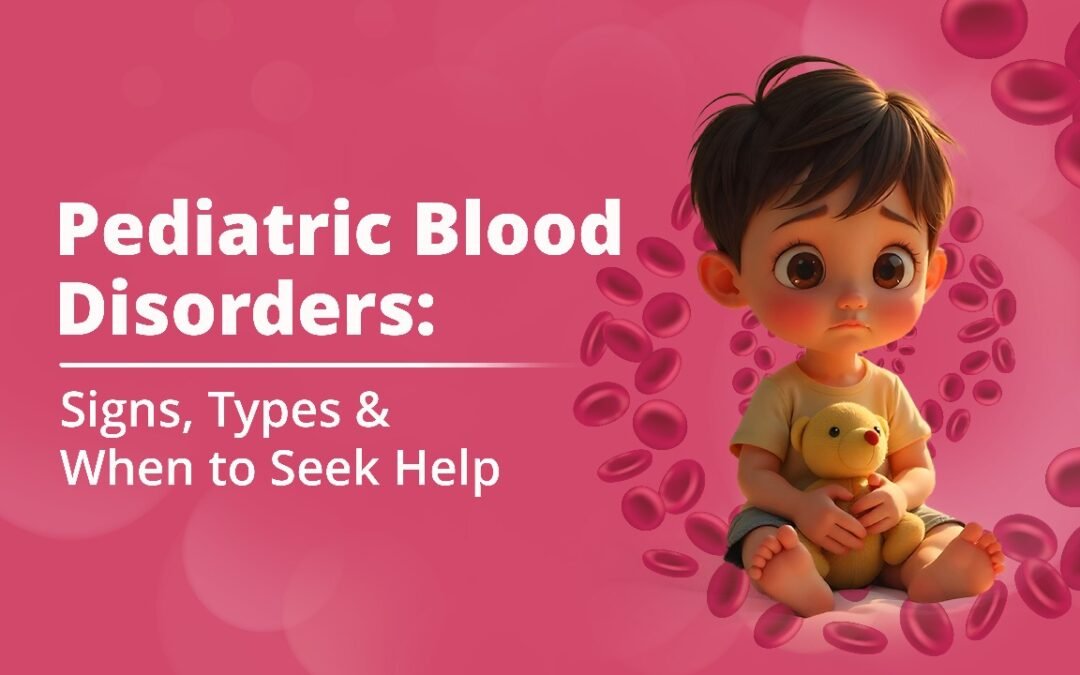Has your child been unusually pale, bruising easily, or feeling more tired than usual? These may be more than just signs of a growth spurt or a viral fever — they could indicate an underlying blood disorder. Pediatric hematology deals with diagnosing and treating blood-related conditions in children —some of which, if detected early, can be managed effectively or even cured. In this blog, Dr. Shraddha Chandak, a leading Pediatric Hematologist, Oncologist, and Immunologist in Aurangabad, explains the common types of pediatric blood disorders, their symptoms, and when parents should seek expert care.
What Are Pediatric Blood Disorders?
Pediatric blood disorders affect the production, function, or composition of blood cells in children. These may involve:
- Red Blood Cells (RBCs) – responsible for carrying oxygen
- White Blood Cells (WBCs) – key defenders against infection
- Platelets – help in blood clotting
Disorders can be benign (non-cancerous) or malignant (cancerous), and may result fromgenetic, nutritional, or environmental factors.
7 Signs That May Indicate a Blood Disorder
Parents should be alert to the following symptoms:
- Frequent or unexplained bruising or bleeding
- Fatigue and weakness even after rest
- Persistent pallor (pale skin)
- Prolonged fever or frequent infections
- Swelling of lymph nodes or abdomen
- Bone pain or tenderness
- Slow healing of wounds or bleeding gums
If your child exhibits any of the above consistently, consult a Pediatric Hematologist immediately.
Common Pediatric Blood Disorders Treated by Dr. Shraddha Chandak
- Anemia in Children
- Caused by iron deficiency, chronic disease, or genetic disorders like Thalassemia.
- Symptoms include tiredness, pale skin, fast heartbeat, and poor appetite.
- Managed through dietary changes, iron therapy, or specialized care for genetic causes.
- White Blood Cell (WBC) Disorders
- Conditions like neutropenia or leukocyte adhesion deficiency impact the body’s ability to fight infections.
- Symptoms include recurrent infections, delayed wound healing.
- Requires specialized immune and hematologic evaluation.

- Platelet Disorders
● Low platelet count (Thrombocytopenia) or dysfunctional platelets can lead to bleeding problems.
- May present as easy bruising, nosebleeds, gum bleeding, or petechiae (tiny red spots on skin).
- Hemophilia & Clotting Disorders
- A genetic disorder where blood doesn’t clot properly.
- Needs regular clotting factor replacement and injury prevention planning.
- Hemoglobinopathies (e.g. Thalassemia, Sickle Cell Disease)
- Inherited disorders affecting hemoglobin structure or function.
- Treatment may include blood transfusions, iron chelation, or bone marrow transplant.

Comprehensive Pediatric Hematology Care
Dr. Chandak’s approach focuses not just on clinical excellence but also on family-centered care. This includes:
✅ Detailed counselling for parents
✅ Support for emotional and psychological wellbeing
✅ Nutritional advice and rehabilitation plans
✅ Long-term follow-up and monitoring
She collaborates with a multidisciplinary team to ensure holistic care for every child.
Diagnostic Tools Used
At Kpond Superspeciality Hospital, Garkheda, Aurangabad (CSN), Dr. Shraddha Chandak uses advanced diagnostic facilities including:
- Complete Blood Count (CBC)
- Peripheral smear evaluation
- Bone marrow aspiration and biopsy
- Coagulation studies
- Genetic and enzyme assays (as required)
Each test is selected based on symptoms and medical history, ensuring a targeted and accurate diagnosis
Why Early Diagnosis is Crucial
Timely diagnosis of blood disorders can:
- Prevent complications like organ damage or growth delays
- Improve quality of life through personalized treatments
- Reduce hospital admissions through preventive care
- Offer the potential for cure in some genetic conditions

When to Consult a Specialist?
If your pediatrician has noticed abnormalities in your child’s blood tests, or if you see the signsmentioned above, early referral to a pediatric hematologist is key. Remember — not all blood disorders are cancers, and many can be effectively treated with timely care.
Conclusion
Blood disorders in children can be complex and frightening, but with the right diagnosis andexpert care, most children can live full, active lives.Trust your instincts. If something doesn’t feel right about your child’s health, get it checked. For expert evaluation and compassionate care, consult Dr. Shraddha Chandak today.
📍 Visit: www.drshraddhachandak.com
🏥 Kpond Superspeciality Hospital, Garkheda, Aurangabad (CSN)

